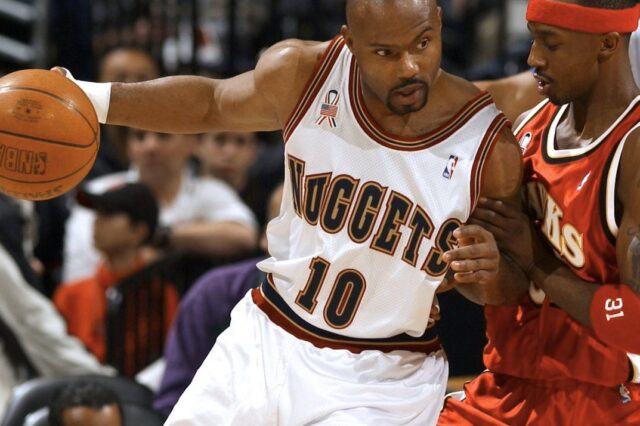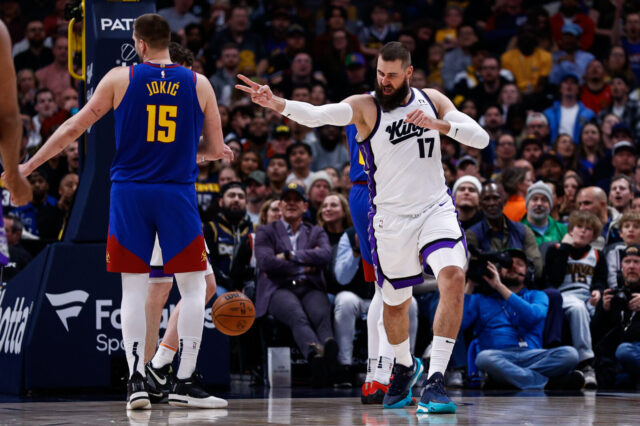 For over 10 years, fantasy basketball has been one of the most frustrating, time-wasting and mind-numbing endeavors of my life. And yet on Monday night I’ll be participating in two drafts simultaneously. I just can’t help myself.
For over 10 years, fantasy basketball has been one of the most frustrating, time-wasting and mind-numbing endeavors of my life. And yet on Monday night I’ll be participating in two drafts simultaneously. I just can’t help myself.
My sports diet is pretty full. For my entire life, I've closely followed the NBA, the NFL, Major League Baseball, golf, tennis and college football and basketball. Left out of my sports diet historically, however, are "boat race" sports like hockey, soccer and, well, boat races. I simply can't get into sports where once one team is ahead early it stays that way for the remainder of the contest. Call me crazy, but I like fourth quarter comebacks, ninth-inning rallies and last second game-winners.
And this is precisely why I can't stand rotisserie fantasy basketball because it turns the best sport in the world – NBA basketball – into a season-long boat race. Something the NBA was never meant to be.
Those who have played fantasy basketball in any sort of rotisserie system or even Yahoo! Sports' poorly constructed "head-to-head" system (where they add up your categories for the week and you're assigned won or lost games based on categories won) know exactly what I'm talking about. Unless you have the good fortune to draft well and keep all of your players healthy, your season is over after four or so weeks. And once your season is over, you don't take your weekly lineup changes seriously, injured players linger in your starting lineup and the next thing you know you're only exacerbating the boat race and prolonging your agony as a team manager.
Conversely, in fantasy football even the worst team has a chance to win on any given Sunday, which is why fantasy football has caught on like wild fire and is by leaps and bounds the most popular fantasy option for degenerate sports fans like me. You could have the worst record in your fantasy football league and face the league's best squad, but if your players have a great day and your opponent's players have an awful day, you win. Hence the phrase: "That's why they play the game."
Like fantasy football, fantasy basketball should also be head-to-head…for 82 games (including saving the final 15 regular season NBA games for playoff rounds). Why fantasy basketball isn't played like this completely befuddles me. Most fantasy basketball participants (foolishly) assume it's too complicated, but it's really not. Here's how an 82-game fantasy basketball season works (and note that major kudos go to Sports.Ws for developing this system)…
Just like in fantasy football – or any real sport – fantasy basketball can be played based on a schedule where teams have a different opponent from game-to-game. Let’s say you’re Team X and your starting five is comprised of Carmelo Anthony at SF, LaMarcus Aldridge at PF, Joakim Noah at C, Tony Parker at PG and Jason Terry at SG with your three reserves being Kevin Love, Lamar Odom and Kirk Hinrich. And on your schedule for Game 1 is Team Y who’s starting five features Kevin Durant at SF, Zach Randolph at PF, Marc Gasol at C, Mo Williams at PG and Eric Gordon at SG with their three reserves being Luis Scola, Mike Dunleavy and Nate Robinson. You would simply take the collective production of your players “real” Game 1 performances – based on standard categories such as scoring, rebounds, assists, steals, blocks, FG%, FT%, three-point FG% minus turnovers – in the NBA and compare them with Team Y’s players Game 1 NBA performances. Whoever comes out ahead wins the game. One win or one loss. That’s it. And then you move on to play Team Z in Game 2 in which your players Game 2 NBA performances are compared with Team Z’s players Game 2 NBA performances.
One game at a time. It's as simple as that for 82 games.
A true head-to-head system takes away the biggest negative in rotisserie sports: injuries. In a rotisserie league, if your team sustains a number of injuries and you drift behind in several categories, you have absolutely no chance of winning whatsoever. Your season is over. Conversely, in a head-to-head league with a playoff system that kicks in for the last 15 or so games, injuries might decimate you for a stretch of individual games but a) you'll win some of those games anyway by your reserves stepping up periodically and b) if your players come back, you're put in a position to rack up enough wins to make the playoffs and do damage in the playoffs. You know, like real NBA basketball.
The argument I often get against an 82-game head-to-head format is that it would take too long to manage your team from week-to-week. Untrue. The league can simply be set up to set your rosters on Monday mornings for the entire week, just like you currently do in any standard rotisserie league. So for those brave enough to try the 82-game format, don't listen to the naysayers.
Unfortunately, as of the writing of this column neither of the leagues I'm participating in will be adapting the Sports.Ws 82-game head-to-head system. I guess it's just easier to keep things the way they've always been where three guys fight to the finish while the other nine hate fantasy basketball – and by proxy the NBA – after one month. Making matters worse for me, the draft for both leagues takes place tomorrow night (one in person, one via web) during the Broncos game and, in one, the league members have decided – disastrously – to adopt an "auction system" for the draft. As a perpetually mediocre fantasy team manager, the last thing I need is for the draft to be overcomplicated with an arbitrary auction system. It's ridiculously stupid, frankly.
So why bother playing at all, you might ask? Because I just can't help myself. After all, you can't proudly call yourself a degenerate NBA fan without playing fantasy basketball.
That said, here's a brief 2009-10 Fantasy Basketball Preview…
Overall, fantasy basketball leagues are rarely won with who you draft in rounds one and two. In fact, these leagues are won and lost based on who you draft in rounds three and onward. Below are some players to keep an eye on after the second round.
Rajon Rondo (Celtics): Rondo blossomed in the playoffs last year, routinely putting up triple-double type numbers. With no primary backup point guard on the Celtics roster and head coach Doc Rivers needing to rest aging veterans Kevin Garnett, Paul Pierce, Ray Allen and Rasheed Wallace, expect big minutes and big numbers from Rondo.
Derrick Rose (Bulls): Ben Gordon‘s departure to Detroit might be bad for the Bulls, but it will be great for Rose’ fantasy numbers. Look for Rose’s minutes and scoring to increase substantially.
Mo Williams (Cavaliers): With Delonte West going off the deep end this summer and the Cavaliers astutely acquiring Anthony Parker at shooting guard, I see Mo being entrenched as the Cavaliers clear point guard and his assists going up as a result.
Brandon Jennings (Bucks): I’m not a huge fan of rookie point guards, but I am a fan of point guards who don’t have a lot of competition for the starting job (my apologies to Luke Ridnour). Jennings is worth taking a flyer on late in your fantasy draft.
Lou Williams (76ers): Williams will probably be overlooked in a lot of drafts, but talk about having no competition for the starting PG spot. Williams has been fairly solid in the preseason, leading the 76ers to a 4-0 record thus far.
Zach Randolph (Grizzlies): Randolph might be a locker room cancer in real life, but on your fantasy team he’s good for almost 20/10 every night…especially on the Grizzlies who don’t have a viable competitor to Randolph at the four spot.
Elton Brand (76ers): I’m seeing Brand’s 2009-10 being somewhat similar to Kenyon Martin‘s 2008-09. Like K-Mart, Brand wants to prove that he’s worth his audacious contract and if the preseason is any indication, Brand is going to do so successfully.
Jeff Green (Thunder): With OKC drafting shooting guard James Harden, Kevin Durant figures to be moved to small forward with Green cemented at power forward. Green made great strides last season and the best is yet to come.
Anthony Randolph (Warriors): Randolph might be too public a pick with all the “experts” circling him on their “players to look for” lists. But with Brandan Wright out four-to-six months with a shoulder injury, Randolph figures to get major minutes resulting in major production at power forward.
Jason Thompson (Kings): The Kings are going to be the worst team in the NBA, but Thompson will get ample playing time. He’s been a terror thus far in the preseason, and I’m expecting big things for his sophomore season.
Emeka Okafor (Hornets): Okafor is getting buried on most draft forecasts, and I don’t quite understand why. With the center position continuing to be the NBA’s weakest, Okafor is one of the better options…especially if your league requires a center or two on the roster.
Greg Oden (Trail Blazers): If healthy, Oden figures to be good for a double-double and two blocks per game.
Joakim Noah (Bulls): 11/17/3, 13/8/4, 12/10/3, 11/17/0, 7/15/2 – those were the numbers in five of Noah’s seven 2009 playoff games against the Celtics. Even with Brad Miller on board, I believe Noah will continue to improve and he makes a solid number two center in any fantasy league.





